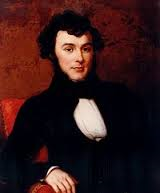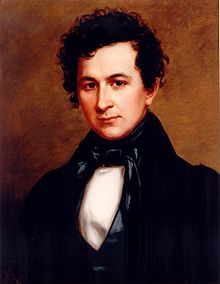To the eighteenth-century Calvinists of New England, children were not curly-headed angels but corruptible beings who needed to be saved from mankind’s worst impulses by a rigorous process of moral education. John Quincy Adams had been raised under just such a stern regimen. John Adams had served as his son’s intellectual taskmaster, and Abigail as his hectoring conscience. Abigail once wrote to her son that she would sooner see him die than fall into bad habits while he was in Europe. He was twelve at the time.
John Quincy Adams did not grow up to be a happy man; and when it came time to raise his own children such a man might well have reflected on his own upbringing. But Adams was incapable of finding fault with his parents. In any case, he was no less rectitudinous than they. After his first two sons, George and John, had been born, and he began to turn his thoughts to nurture, Adams, read, and admired, “Discourse on The Education of Children and Youth,” by the early-18th-century churchman Isaac Watts, who railed against “fashionable education,” and came down on the side of “severity” and “rigour.” His wife, Louisa, favored gentle persuasion over harsh instruction. She lost the argument.

George Washington Adams
Adams oversaw the boys’ education from a distance. George had been born in 1801, and John in 1803. During Adams’ tenure in the Senate, from 1803 to 1808, they boys remained with their grandparents and uncles and aunts in Quincy, while their parents spent the winters in Washington. Louisa pined for her children; her husband may have felt the same, but would not have permitted himself to say so. In 1809, when Adams was appointed minister to Russia, he decreed that Louisa and their new-born, Charles Francis, would accompany him, while George and John would stay behind. Louisa was prostrated with grief. Adams could have taken George and left Louisa with the younger boys, just as John Adams had taken the 10-year-old John Quincy to France. It was not, however, a matter for discussion.

John Adams II
Once in St. Petersburg, Adams received glowing reports about George from his mother and his aunt, who raved about his “capacious mind,” his “quickness of apprehension,” his attentiveness, his love of history. Adams nevertheless tried to direct his education from afar. He wrote to his brother Tom to say that he must pay attention to George’s French, but also to his drawing, fencing, shooting. The young man should be inured to labor and fatigue, and avoid all “delicate or effeminate” pursuits. Tom and their father John should subject George to a monthly examination on his studies, one which would test not simply his memory but his understanding. He wrote to George with exactly the sort of warnings he used to receive from his own parents: “I hope to always hear that among your companions, the best boys are your best friends, and I trust you will always be ashamed to let any one of them learn faster or by his good conduct make himself more beloved than you.” He also sent George an extraordinary series of letters on Christianity which must have gone miles over the boy’s head.
The pattern never changed. Adams believed that he could offer his children nothing so precious as the fruits of his own-hard won wisdom. In 1818, back in Washington as Secretary of State, Adams received a letter from fifteen-year-old John complaining of hard treatment from Uncle Tom, who had become his surrogate father. He wrote back: “You boast of your studying hard, and pray for whose benefit do you study? Is it for mine, or for your uncle’s? Or are you so much of a baby that you must be taxed to spell your letters by sugar plums? …If so, I desire you not to write for anything to me.” George got off no better.
Adams worried incessantly that his children would fail, would sully the family name or perhaps even put an end to it. His own brothers, Tom and Charles, had lived dissolute lives. And the pattern was to cruelly repeat itself. Charles Francis would become a celebrated diplomat and author; his older brothers would die young, after hapless lives, leaving John Quincy and Louisa grief-stricken and debt-ridden.
The trajectory of any individual life is a mystery which can not finally be reduced to causes and effects. But it’s hard to avoid the thought that the boys would have had a better chance in life had they spent more time with their parents, as Charles Francis had, or had Adams felt that he could openly show the deep love he felt for them. Charles Francis would speak in later life of the “iron mask” which so often rang down over his father’s features. It’s an image to freeze your blood.